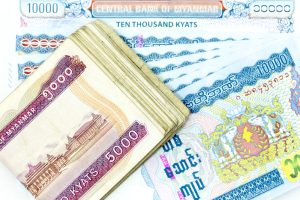Myanmar’s military government junta is threatening legal action against anyone found to be in possession of foreign currency without the proper authorization, as it makes increasingly desperate moves to shore up the country’s economy.
The Central Bank announced on Sunday that those in possession of foreign currencies without permission will face charges under the Foreign Currency Management Law, the junta-run Global New Light of Myanmar reported.
According to the law, the report stated, “A resident can possess, for up to six months from the date of receipt, US$10,000, or other types of foreign currency in an equivalent amount, if obtained legally by this person. If the foreign currency is not used within six months, it shall be sold to, and exchanged by, foreign exchange dealing license holders at the market price or deposited in a bank account.”
The law states that exchanging and selling foreign currency without license is punishable by up to three years in prison, a fine, and the confiscation of the related assets.
The announcement, as this report from Radio Free Asia (RFA) makes clear, is an attempt to fight the black market money changers who have returned to prominence in the economically strained times since the military coup of February 2021. On August 18, RFA noted, the Myanmar kyat fell to an all-time low of 3,900 to the U.S. dollar, down a remarkably 300 percent since before the coup, when it was trading at around 1,300 to the dollar.
It reflects the economic damage inflicted by the military coup of February 2021, and the various economic distortions that have followed in its wake. In June, the World Bank said in a report that Myanmar’s economy had been “permanently scarred” by the coup and the concurrent impact of the COVID-19 pandemic. The country’s economy contracted by 18 percent in the year following the coup, and at its current pace – the World Bank projected that the economy would grow by 3 percent in the year to September, after 3 percent last year – it is unlikely to return to pre-coup and pre-COVID-19 levels until at least 2027.
As a number of sources told RFA, the measures are unlikely to stem the declining value of the kyat, which is a downstream effect of the country’s economic uncertainty. This has prompted a mass flight into U.S. dollars, which people logically see as the safest and most reliable currency. But supplies of U.S. dollars have been limited by the Western sanctions, such as those that the U.S. Treasury Department imposed in June on the Myanma Foreign Trade Bank and Myanma Investment and Commercial Bank, two of Myanmar’s largest government-controlled banks, which function primarily as foreign currency exchanges that enable the “conversion of kyat to U.S. dollars and euros and the reverse.”
With more kyats chasing fewer greenbacks in a context of economic uncertainty and privation, the price of dollars has unsurprisingly spiraled upward.
Under the old military junta that ruled prior to 2011, the black market was the only accurate gauge of the value of the kyat. The currency traded for around 1,000 kyats to the U.S. dollar, while the official rate – that offered by currency exchange booths at the country’s airports, for instance – was artificially pegged to as few as six kyats to the dollar. The large gap between the official and unofficial rates created opportunities for the military to earn arbitrage from official transfers, like foreign development assistance.
During these years, there was a very real sense in which the black market effectively kept the moribund economy afloat, which the junta acknowledged by turning a blind eye to most “unofficial” currency traders. While the circumstances are not quite the same now – indeed, by many metrics they are worse – the junta’s restrictions on foreign currency look a lot like an attempt to hold back a surging river. As long as the country, and the economy, remains in its current state of crisis, the black market will become ever more important to the people’s basic survival.

































